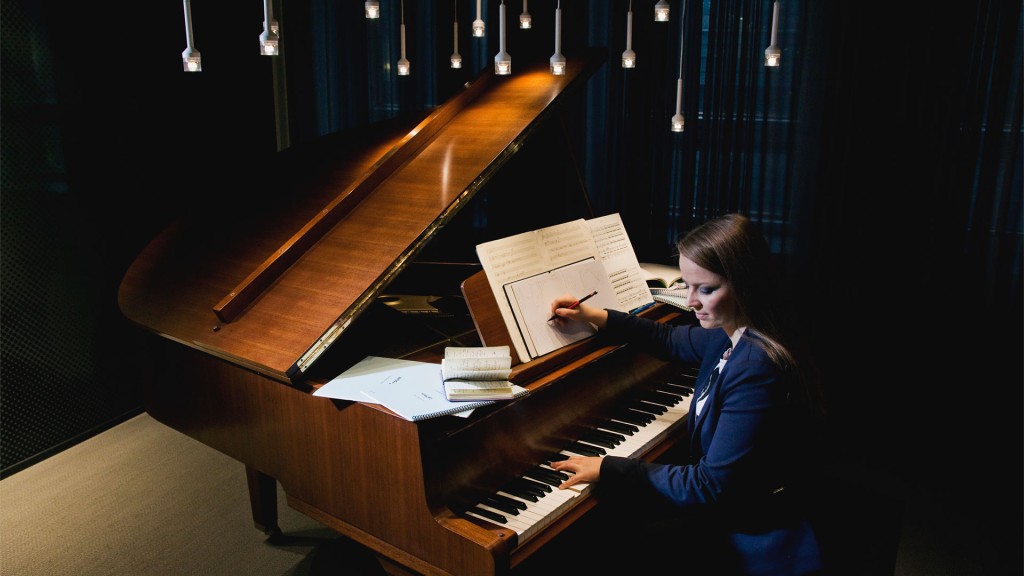
Services for Composers
Composer Cecilia Damström
Member of Teosto since 2010
Teosto’s basic services are identical for both composers of contemporary music and authors of popular music. However, some practical matters, such as grants and performance notifications, differ in popular music and contemporary music. On this page, you will find essential information for composers of contemporary music.
Joining Teosto as a member and services for composers
The path to membership and the associated fee are the same for all individual members. You can become a Teosto member when at least one of your compositions (or set of lyrics or arrangements) has been performed publicly or published as a recording. Public performances include concerts (including concerts organised at educational institutions during studies), radio play, TV broadcasts and even street music.
We recommed you to Teosto as soon as your compositions are being publicly performed: as a member, you not only receive the royalties you are entitled to for the performance of your music, but also help and advice from our customer service, newsletters and member events. Underage composers can also become members when their guardian signs the membership application.
When you join Teosto, you become a rightholder member. If you wish, you can also apply to become a voting member of Teosto if certain distribution-related criteria are met. As a voting member, you can attend Teosto’s General Meetings and participate in the joint decision-making. Voting membership is applied for separately, and decided by Teosto’s Board of Directors.
You can also find useful and important information on the website of our member organisation the Society of Finnish Composers. The society is an expert organisation that supervises and promotes the artistic, professional and economic interests of its members and supports Finnish creative musical art. It is worthwhile applying for membership of the Society of Finnish Composers when you meet its membership criteria.
PLEASE NOTE! You can become a Teosto member even if you have not yet met the membership criteria for the Society of Finnish Composers.
Always submit a work notification
When you become a member, you assign to Teosto the administration of the work-related rights of music you have created, for both your existing and new future works.
In order for us to pay you royalties for the public performance of your music at concerts, on radio or TV or in streaming services, you must submit a work notification for all your works in our web service. With the work notification, we register your work in a global work database, which makes it possible to identify your work when it is performed in Finland or abroad and to allocate the royalties we collect for the performance to you. You will receive web service login credentials when you become a member.
A work notification must also be submitted if you compose music for a purpose that falls within the scope of so-called automatic self-administration. Self-administration means that the author themselves – or their publisher if the author has a publishing agreement – grants the licence to use the music and also defines and invoices the royalties for using the music. Failure to submit a work notification does not mean that the work in question is outside Teosto’s administration.
Self-administration, grand rights and small rights
Automatically self-administered works include, for example, music composed for a work performed on stage to an audience present in its stage execution, e.g. music in operas, operettas, ballets and musicals. These works are called original grand right works. The TV or radio broadcasting of a work performed to an audience present at the venue in a form that is completely identical to the stage version also falls within the scope of grand rights.
However, if only a part of the work is performed on radio or TV, for example, the rights associated with this performance are no longer grand rights, but instead become small rights, in which case Teosto collects the performing right royalties. If no work notification has been submitted, the work and its authors cannot be identified and we cannot distribute the performing right royalties collected for the part of the work.
The synchronisation rights* of your compositions are automatically self-administered also if the music you have composed is used in films intended for cinema distribution, for example, and their synchronisation and reproduction rights are automatically self-administered if the music composed by you is used in an advertisement. However, the performing rights of the work (and, for films, also the reproduction rights) are administered by Teosto, unless you specifically move these rights to self-administration.
*synchronisation = incorporation of music in moving images
Performance notifications and performance reports
In contrast to popular music, in contemporary music, the composer rarely performs their own works. However, if the composer also performs their own compositions, they must submit a performance notification for the concerts and other performances of their music in our web service.
Most often contemporary music is performed by orchestras, which also pay the performing right royalties for the use of music. In these cases, the tasks of the orchestra or its background organisation include the reporting of the performance to Teosto so that we can allocate royalties precisely to the works performed.
Symphony orchestras, municipal orchestras, the Conservatory Association of Finland, the Association of Finnish Music Schools, the Sibelius Academy of the University of Arts Helsinki and many other performers of contemporary music have an agreement with Teosto, defining the amount of royalties for using music and the schedule for reporting music-related information. For the use of music on radio and TV channels and in online services, we receive performance reports.
PLEASE NOTE! Most of the performance reports of orchestra concerts are delivered to us twice a year by the Association of Finnish Symphony Orchestras (SUOSIO): the spring term performance report (January–June) is delivered in early autumn and the autumn term performance report (July–December) at the beginning of the following year.
The reports are based on the concert calendar maintained by SUOSIO. Please also check that all the orchestra performances of your composition are included in the concert calendar to ensure that their performance reports are also in order! If your work is not in the concert calendar even though it has been performed, contact the concert organiser and ask them to notify SUOSIO of the concert.
For what kind of music use can a composer receive royalties?
Teosto collects and distributes royalties for the public performance, transmission to the audience and reproduction of music.

Public performances include concerts, gigs, other events that contain music as well as stage and cinema performances.

Transmission to the audience refers to playing music on radio and TV and in online services. Royalties are collected for performing and playing music, both live and recorded.

Reproduction refers to the recording of music on a recording medium, such as a CD, a vinyl record or a digital audio recording medium. One form of reproduction is also so-called synchronisation, i.e. the incorporation of music in moving images, such as TV programmes, films, advertisements or other videos.
A significant proportion of composers’ royalties come from the performance of contemporary music on radio and TV. Significant sources of royalties for composers also include concerts organised by symphony and municipal orchestras, Yle FRSO, municipalities, parishes, garrisons, music institutes, conservatories and the Sibelius Academy as well as for other individual concerts, events and festivals, i.e. so-called Event Licence events.
Separate agreements have been negotiated with the above-mentioned parties, excluding Event Licence events, for which the event organises pay royalties according to the public price list. In both cases, royalties collected are distributed to the works performed and played on the basis of the performance reports received from music users.
Check your distributions in our web service
We pay distributions four times per year. Most of concert royalties are distributed once a year in June. The amount of money paid in distributions depends on the amount of royalties collected from music users in each year. The distribution amount of an individual author depends on how many times their work has been performed, among other things.
The composer should also be active and check our web service after the distributions to make sure that all the performances they are aware of have been reported and allocated correctly so that the royalties could have been paid. If you notice that your distribution is completely missing a royalty that, according to your knowledge, exceeds the payment limit of 25 euros, you can submit a complaint regarding the missing royalty in our web service.
In Teosto’s distribution rules and their appendix, the distribution area list, you will find the principles for how Teosto distributes the collected royalties to the composers and music authors whose works have been performed. Distributions are based on music performance reports.
Grants and support for composers
Many parties award grants or support to composers of contemporary music for working or to those commissioning a work for paying the commission fee. This support includes the support distribution for Finnish music (formerly the grant for score-based music ) and the commission grant, both awarded by Teosto. The Society of Finnish Composers also has its own grants and maintains a grant calendar, listing grants that composers can apply for.
How can you have your music performed?
In addition to distinctive, interesting and composition-technically ready works, getting your own music to be performed and played often requires the composer’s own active and long-term promotion work. It is also important to be willing and able to network with both fellow composers and musicians and people involved in orchestras’ background organisations.
Participating in different composing contests, contemporary music festivals and events is a great way to showcase your own music and also network with others. Contests and events can also give you good tips on how to develop your own work.
A high-quality website and presence on social media (Facebook, Instagram) are nowadays important communications and marketing channels also for composers. The website should contain at least a short introduction about yourself, your CV, one or more good photos, samples of music to listen to or a score sample and, above all, your contact details. The ability to transcribe different instruments’ parts in the composition and to prepare the score layout so that it is ready for performance is never wasted.
Various visibility and sheet music distribution services targeted at composers are offered by the Teosto-supported Music Finland.
Music publishers
The most important commercial partner of a composer of contemporary music may also be a music publisher, who works actively to get the works of the composers they represent to play in different places. It is a good idea also for young authors to approach publishers and discuss cooperation opportunities.
A composer may also establish a publishing company and publish their music themselves. More information about different revenue models and also the taxation of copyright royalties can be found on these pages.